When you're preparing for camping season, one area that will change is the kitchen! In an RV, your space is limited. One way you might suffer from this issue is by the size of the fridge. How big is an RV fridge compared to the one you own at home? If that's what you're wondering, let's find out.
An RV fridge will not come in the same size as a residential fridge. It will range between 4 to 12 cubic feet. However, the most common sizes are between 4 to 8 cubic feet.
As you can see, there's a massive drop in size between a regular refrigerator and an RV one. While size is one noticeable difference between the two, there's still more you might want to know. An RV refrigerator does not operate the same as a regular one. If you'd like to learn more about the differences, keep reading ahead.
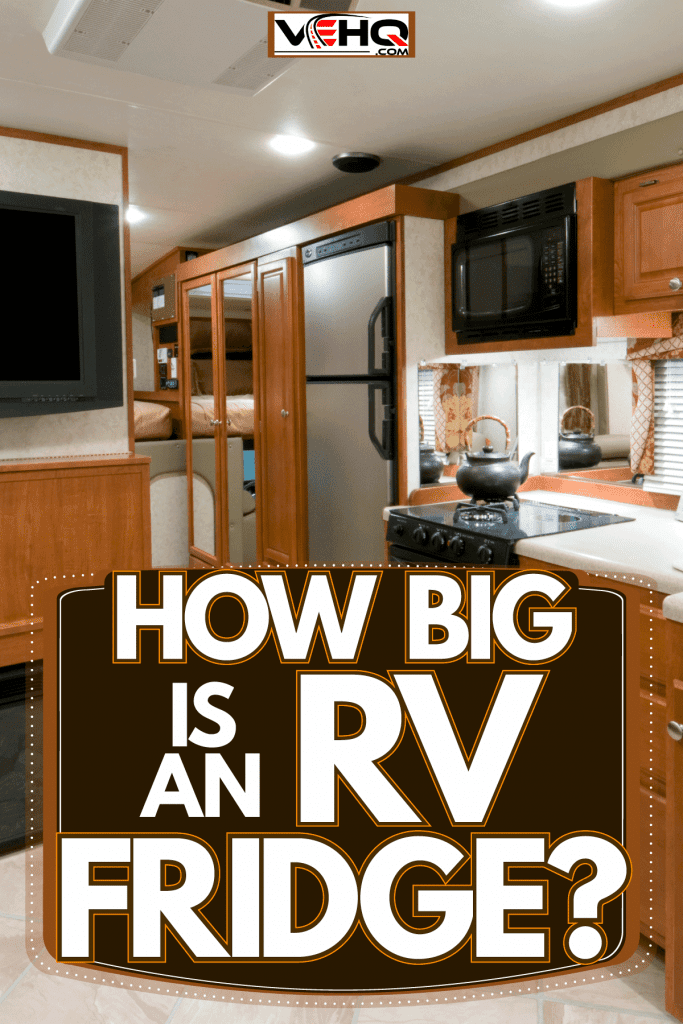
The Changes You Are Making
If you're moving into an RV, the fridge is one of the first appliances where you will notice a substantial difference. The compact size might require you to relearn how to shop! So, how much fridge space are you giving up when you switch to an RV fridge?
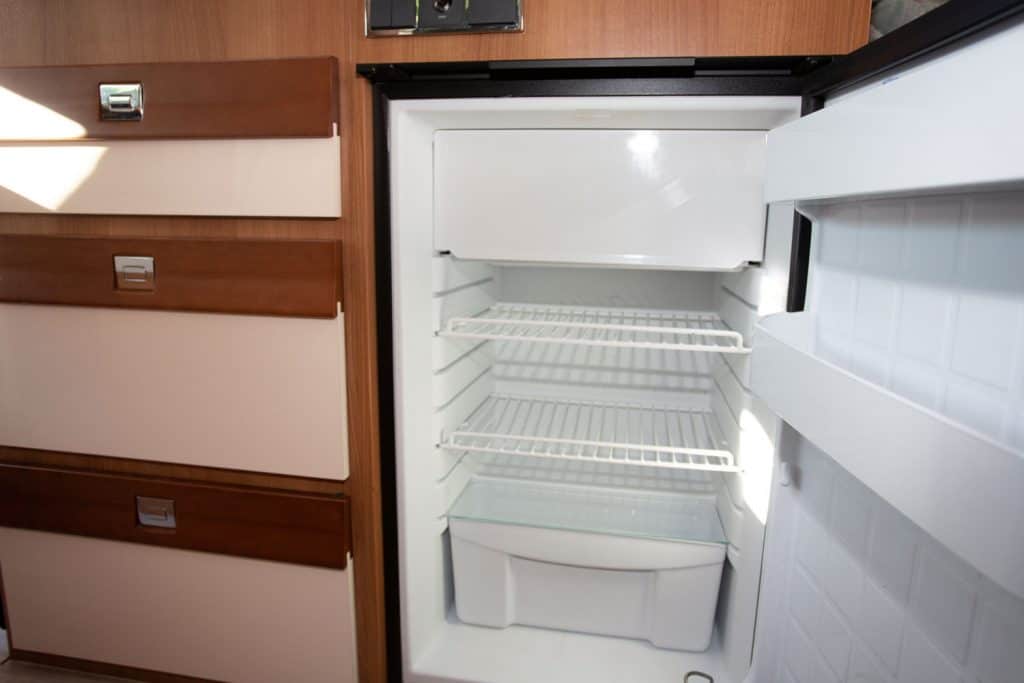
It will depend on your situation at home. If you have a big family, you likely own a fridge that's between 14-24 cubic feet. In general, the size you will require depends on how many people are with you. The rule of thumb is four cubic feet per person minimum.
As mentioned above, the largest size of an RV fridge will be around 12 cubic feet. Though, you'll most likely find that your RV comes with one that's 4-6 cubic feet.
Of course, if you want to upgrade the fridge, it's not going to be cheap to do so. You'll have to make accommodations that require messing with electric and gas lines. So, it'd be best to leave removal and installation to a professional.
How To Adapt to the New Size
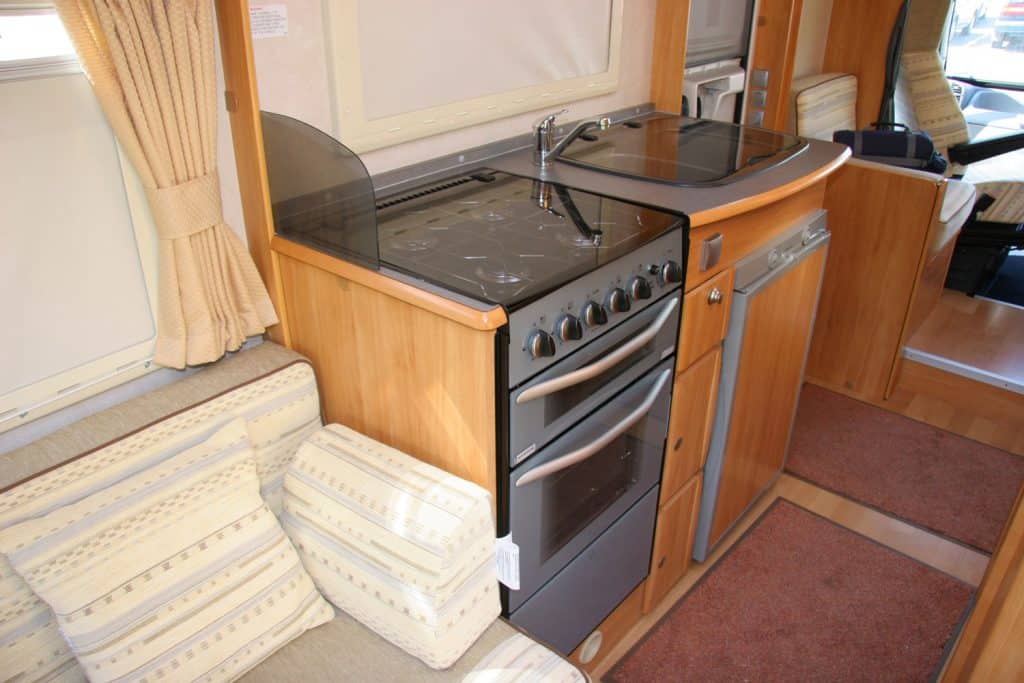
Since there's a size difference, you might be wondering how you can adapt to the change. The two factors that will determine how successful you are with dealing with a compact fridge include:
- The amount of food you purchase
- How you store the food
The advantage a residential fridge gives you is fewer visits to the grocery store. With an RV fridge, you won't be able to stock up as much as you would before. So, you'll have to plan on making more visits to the grocery store if you run out of food.
One way you can save space is by repackaging the foods you buy. For example, meats will usually come in a styrofoam tray that is not space-friendly. To work around this issue, you can separate it into meal portions. Then, move it into a zip-lock freezer bag.
You can do the same with other foods like vegetables. Cut them into meal-size portions and store them away in a zip-lock bag. This way, when the time comes for cooking, you have ingredients ready to be cooked.
If you're not already using plastic containers, now would be a good time to do it! They're great for storing many types of food. Additionally, they stack easily. So, you're saving more space by making the switch.
Now that we've covered how you can adapt to a compact fridge let's go over the other differences between an RV refrigerator and a regular one.
What Is the Difference Between an RV Refrigerator and a Regular Refrigerator?
The crucial difference between a regular refrigerator and an RV refrigerator is how they work. Fridges that work in your home will typically use a compressor to keep your food cold. RV fridges do not use a compressor. Instead, it uses a process of absorption.
An RV fridge is also known as an absorption fridge. It works using heat and chemical reactions. Let's go over how it operates.
- First, heat is supplied to a combination of ammonia and water. It reaches its boiling point, turning into a gas.
- The combination of ammonia and water acts as a refrigerant. Once it turns into gas, it travels through a separation chamber.
- In the separation chamber, water vapor condenses back to liquid form. Then, the liquid water returns to the absorption chamber.
- Ammonia will remain in a gas form. It will continue to rise through a condenser coil where it extracts heat.
- During this process, the ammonia will condense to a liquid form.
- Hydrogen gas produced during the condensing cycle will separate and return to the absorption chamber.
- At this point, the ammonia is cool enough to flow down to an evaporator coil. While making its way down, it will draw heat from the freezer and refrigerator compartments.
- The heat absorbed will cause the ammonia to return to a gas state.
- The ammonia will continue to travel until it reaches the absorption chamber.
- The process repeats.
Although both types of fridges are trying to achieve the same goal, how they accomplish the task is what differentiates the two. Now, you might be asking, why does an RV fridge use a different method to keep food cool?
Other Differences
The answer to that would be convenience and practicality. As some suggest, a regular fridge won't last long in an RV. Residential fridges are designed to be stationary. As you can already guess, your RV won't stay in the same spot all the time. You're going to be on the move in most cases.
The components in a fridge won't withstand the shaking and bumping along the road for long. Before you know it, it will break down. For this reason, an absorption fridge uses no moving parts.
In addition to being able to withstand the bumpy ride, RV fridges also have two ways to operate! The first way to power an absorption fridge is through AC power. It will receive this type through a shore power connection or a generator.
If you don't have access to AC, you can also use liquid propane gas to power the fridge. This type of absorption fridge is known as a 2-way fridge. There are smaller ones that can also use 12V DC power. It's known as a 3-way fridge.
Can You Use a Regular Refrigerator in an RV?
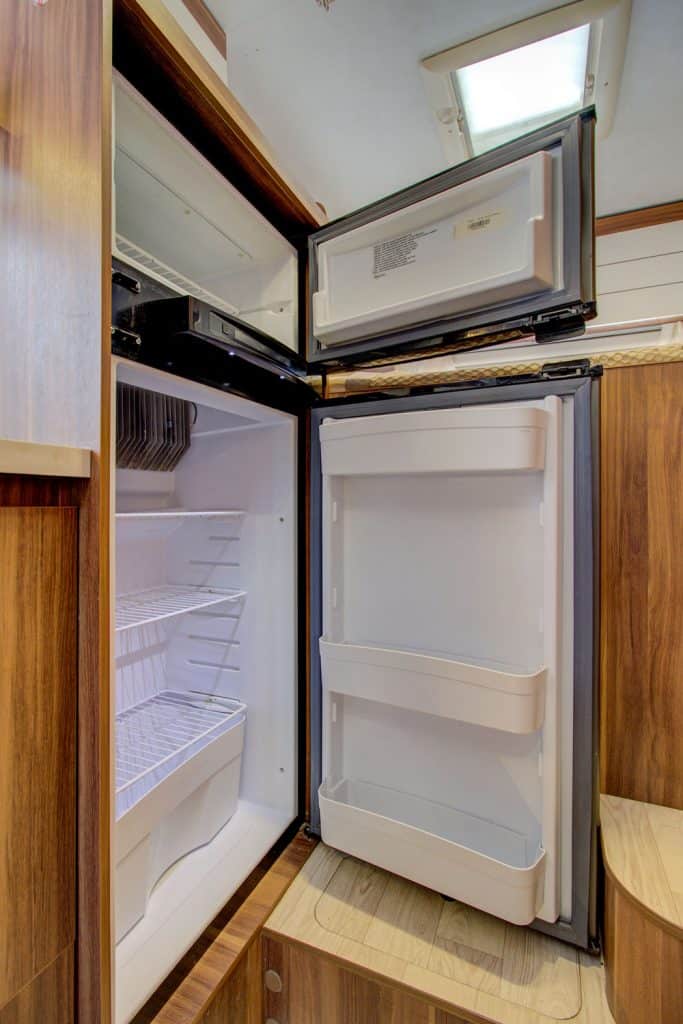
Depending on the size of your current RV fridge, you might be considering upgrading to a regular fridge. Is this job possible? It is—but there's a lot of considerations to make.
The first would be airflow. Residential fridges use a condenser to keep your food cool. It will require around 2-inches of clearance from the rear, 2-inches at the top, and half an inch at the sides.
If you cram it into a tight space, you will reduce the cooling capacity. Additionally, the components in the fridge will wear out quickly. The other factor you will have to consider is power. Absorption fridges will have 2-3 sources.
A regular fridge will only work with 120V AC power. So, if you're not planning to stay near shore power or you don't have a generator with you, you will not be able to keep the fridge running.
Why Are RV Refrigerators So Expensive?
RV refrigerators are expensive because of their design. They won't run on only one source of power. They can also operate on LP gas, AC, and DC power.
So, if you're planning to stay in areas without constant access to electrical power, you can run it with propane. This method can last you a week or so.
Should You Leave RV Fridge on All the Time?
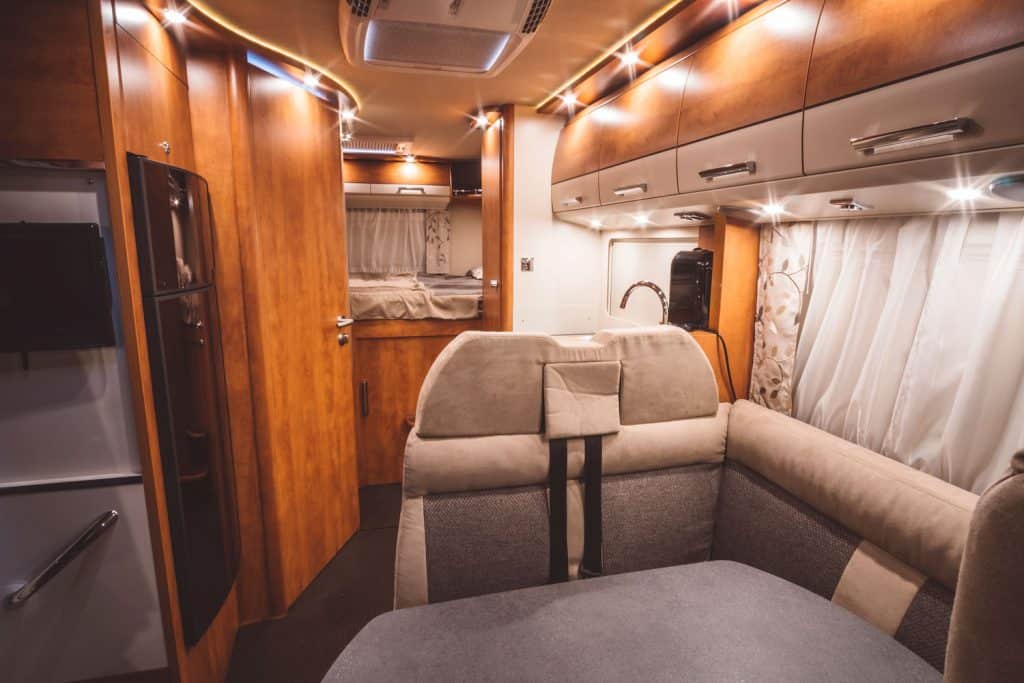
Leaving the RV fridge on the entire time is down to personal choice. If it's in use, you can leave it on to keep your food fresh. But, you do run into some risks if you keep it on all the time. More specifically, you're at risk when driving on the road or near a gas station.
As some RV owners suggest, leaving your fridge running all the time when you are using propane can turn a car accident into a fatal one. A propane leak during an accident can spark a fire or even trigger an explosion. In this case, it's better to keep the fridge off.
In other cases, such as refueling, it is required by law to turn off all sources of ignitions. It's a widely debated topic that will ultimately rest on what you're comfortable with.
How Long Do RV Fridges Last?
An RV fridge from a reputable brand will last around 12-15 years. Of course, it depends on how well you keep up with maintenance.
How you use the fridge also influences the lifespan. If you're finding yourself overfilling it, you might be overworking the unit. It will have to work harder to keep the fridge cool. Thus, it will wear the inside components down.
Keeping up with repairs is the last factor that influences the lifespan. If problems show up, make sure you get genuine and quality parts to fix the issue.
Final Takeaway
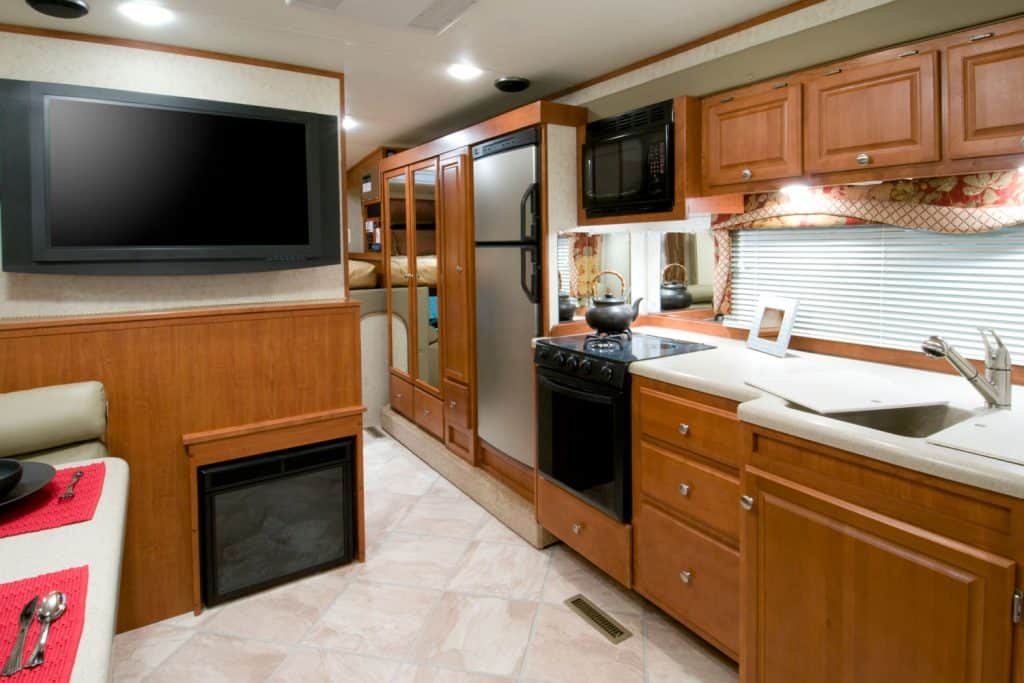
RV fridges aren't as big as regular ones, but there's a reason behind that. Since you're on the go, the refrigerator will need a different method to cool your food. Space limitations also factor into why it's smaller than your standard home fridge. We hope you found the information above helpful!
Before you go, do you still want to learn more about the difference between a residential fridge and an RV fridge? To learn more, check out this post: RV Fridge vs. Residential? (What You Need To Know About RV Refrigerators)
If you'd like tips on maintaining an RV fridge, read through this other post: 14 RV Fridge Maintenance Tips (And A Troubleshooting FAQ)
